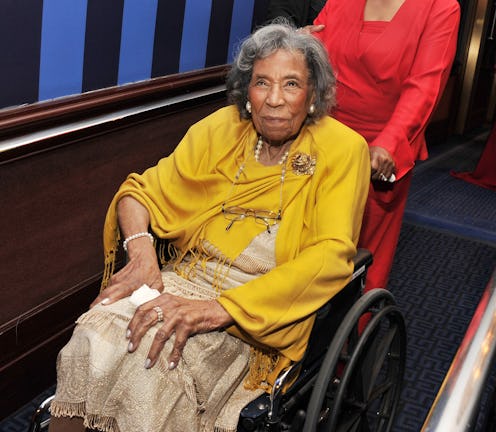News
Amelia Boynton Robinson Changed History
Amelia Boynton Robinson, the 104-year-old matriarch of the voting rights movement and one of the principal organizers of the 1965 March in Selma, passed away this week in Alabama. Robinson was one of the hundreds who were beaten and gassed on what came to be known as Bloody Sunday. But her work, like that of many others who made the historic Voting Rights Act possible, had gone largely unnoticed in favor of the stories of the iconic men behind the Civil Rights Movement. After 50 years, it's only just beginning to gain national attention how Amelia Boynton Robinson shaped the voting rights movement.
Some have argued that women have been edited out of civil rights history, citing little-known facts about how female activists were treated by their male counterparts. Men and women campaigned for civil rights, but women were often relegated to background jobs, such as preparing meals, training student organizers, and supporting the grassroots movement. For instance, a USA Today report during the 50th anniversary of the March on Washington included stories from women who were part of the march, but were forced to walk separately from male leaders. Clayola Brown, president of the A. Phillip Randolph Institute, told USA Today that women were allowed to sing, but were largely kept from addressing the thousands of protesters who convened that day.
Robinson is a near-perfect example of Brown's point. Don't believe me? Here are four crucial contributions that Robinson made to the voting rights movement, which few recognized until her later years.
She Was Holding Voter Registration Drives In Alabama For 30 Years Before The Selma March
A graduate of Alabama's Tuskegee University, Robinson founded the Dallas County Voters League in rural Alabama in 1933, alongside her first husband, Samuel Boynton. The couple worked on gaining voting, property, and education rights for poor African American farmers in Alabama through the 1960s.
She Was The First African American Woman To Run For Congress In Alabama
When Samuel Boynton died in 1964, Amelia launched a bid for Congress, running as a Democrat. She was the only female candidate and the first African American in Alabama to seek national office. She didn't win the election, but she sealed her place as a civil rights leader by earning nearly 10 percent of the vote.
She Invited Dr. King To Join The Voting Rights Movement In Selma
In a point that was largely ignored until the release of the movie Selma last year, Robinson invited Dr. Martin Luther King, Jr. to join the growing movement for suffrage in Selma. According to Biography.com, Dr. King told the Michigan Chronicle that Robinson approached him "just before Christmas in 1964 and said, 'You need to come and help us in Selma,' and that is where the Selma movement started."
She Helped Organize The March From Selma To Montgomery In 1965
After the 1965 death of Alabama teen Jimmie Lee Jackson, Robinson worked with King and the Southern Christian Leadership Conference to organize a 50-mile march from Selma to Montgomery. She was among the 600 protesters stopped on the Edmund Pettus Bridge on what came to be known as "Bloody Sunday," and was left for dead after being beaten unconscious by state troopers.
The story of the civil right movement in the United States is usually told by recounting the experiences and legacies of a few heroes. Every history textbook touches on the stories of leaders like Martin Luther King, Malcolm X, Thurgood Marshall, and A. Phillip Randolph. And most deeper studies of civil rights and voting rights history includes those whose work continued into recent years, such as Julian Bond and Rep. John Lewis.
But the movement toward equal protection and treatment for minorities is actually the product of millions of activists, whose names and faces are far less known. That's why understanding the role of women like Amelia Boynton Robinson is so important. Raising awareness of female activists not only honors their legacy, but creates a path for more female leaders to take part in social justice movements and be recognized for their work.
Images: AmeliaBoynton.org (2); Wikimedia Commons (1)
